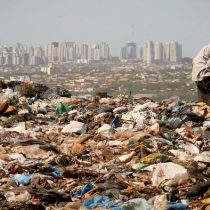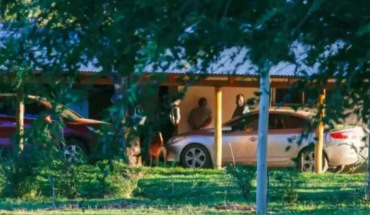
Abandoned cans and bottles in the corners of the streets and parks become precious goods with which to get a little money out of nowhere. Although it could be a situation that occurs in Latin America, it is a common scene in German cities, where it is customary to leave this type of waste out of the container.
“People with a good salary or average salary leave them there because they don’t care about the 25 euro cents they initially paid” guarantee, explains to DW Henriette Schneider, Circular Economics expert at Deutsche Umwelthilfe. It is a warehouse whose price is integrated into the sale of the packaging.
“People who pick up bottles are people who want to make extra money or homeless people,” he says, noting that they “pick up the bottles, take them to the supermarket and get the deposit back from these containers.” This system allows for “a very small proportion of bottles to be left on the streets,” he says. “98.5% of bottles and cans are returned,” he stresses.
The first link in recycling
Across the Atlantic, hundreds of thousands of people have made this activity a profession and spend long days walking the streets of cities in search of paper, cardboard, metal or glass. That’s the day-to-day life of Latin America’s base recyclers, the first recycling link in the region. And also the most precarious. The global coronavirus crisis further weakened the delicate situation of recyclers, due to quarantines imposed by different countries in the region, with few exceptions.
“In Colombia they began to quarantine materials, but they kept working and collecting,” Jadira Vivanco, Coordinator for Colombia and Central America for Latitude R, explains to DW Jadira Vivanco. This regional inclusive recycling organization struggled to obtain permits and that “basic recyclers were included within these exceptions, because they were an essential part of the provision of the service, not everything could end up in landfill and many of the recyclers had to continue working to survive,” he explains.
“Colombia had them from its first instance and as part of the exceptions, they could leave. We managed to have permission in El Salvador, in the municipalities of greater San Salvador, so that recyclers could leave for hours. Peru managed to have these negotiations through a guide that we entered,” he recalls, targeting other cases such as Ecuador, Chile, Brazil where exceptions were also made that facilitated the free movement of basic recyclers during quarantine. “Despite quarantine, in most countries many recyclers went out for hours to collect,” he adds.
It also goes on to say that “governments understand that it is necessary that if there is a quarantine of these conditions as strict as we had at the outset, recyclers need to continue working to continue recovering materials.”
Precariousness without borders or recognition
According to Latitude R, around 2 million people engage in this activity in Latin America and the Caribbean, contributing 50% of what is recycled in the region. However, Vivanco stresses that it should be noted that there are no censuses available from all countries. “Brazil, Chile, Argentina, Ecuador and Colombia are the countries that are a little more aware of the number of recyclers they have,” he says. In the latter country, “only in Bogota, in 2019, the company responsible for having these censuses updated, the Administrative Unit of Public Services (UAES), declared having between 25 and 30 thousand recyclers,” he adds.
“In Colombia, we would have about 100,000 recyclers, not all identified, because not everyone is in a formality process,” he says, referring to those outside a recycler cooperative. According to your data, only 10% are organized. The rest are still in a process of informality and work in conditions of marginality and job precariousness. For this reason, although Brazil and Colombia stand out as benchmarks in the formalization of these workers in the region, many countries like Argentina are still in process. Although “Buenos Aires is one of the cities that is implementing policy issues, there is no policy of national scope,” he says, emphasizing the role played by the Argentine Cartoneros Association.
In Central America, the case of el Salvador stands out, where “several recyclers of their own motion began to organize the process of home collection, that is, they can go door to door”, explains the coordinator for Central America of Latitude R.
“The issue of organizing base recyclers is emerging very strongly to make frentand all the problems they’re starting to have,” like installing containers in buildings, he says.
Likewise, these workers are key “to implementing circular economy models in Latin America”. “One of the most powerful tools today and already being done right now in Latin America, is recycling in usable materials, and as the main suppliers of that recycling are the basic recyclers, so we believe that inclusive recycling is one of the tools that will clearly make circular economy models feasibl,” he says.





